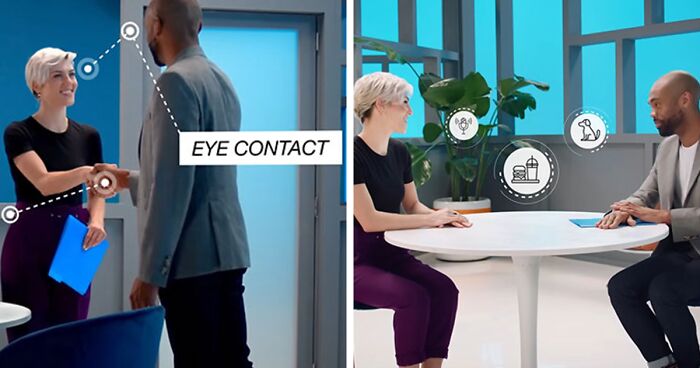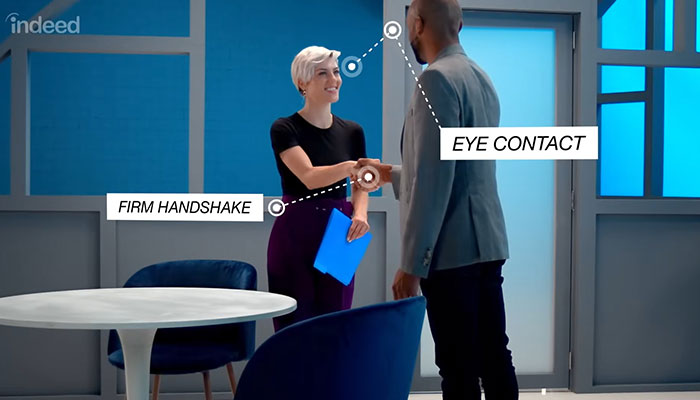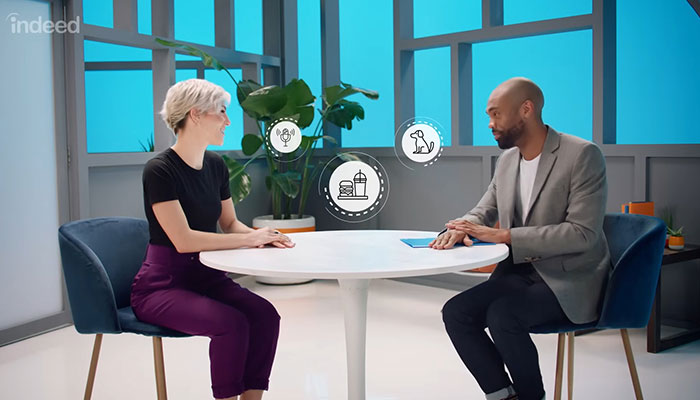
8submissions
Finished
“‘I’m Too Organized’ Isn’t A Weakness”: HR Experts Share Tips To Get Hired Faster
Interview With ExpertJob interviews are undeniably stressful, regardless of your age or years of experience. After public speaking, the job interview comes second on the list of situations that make us most nervous, followed by going on a first date, according to a survey by American employment screening company JDP. Some ease their nerves by practicing with friends or family, while others set multiple alarms on their phones just in case they miss the important meeting.
To help you feel more confident for your upcoming interviews, Bored Panda consulted with two experts in the field for tips on achieving success.
Firstly, we spoke with Cristian Ruiz, a consultant and expert in employment at Robert Walters, a consultancy specializing in the search and selection of intermediate, managerial, and executive positions. We also gathered insights from Sofía Di Benedetto, a recruiter at BetterPros, a Miami-based company that connects businesses in the US with professionals from Latin America.
Check out the experts’ advice on how to ace your interview, including everything from preparation to follow-up.
This post may include affiliate links.
Preparation Pays Off
Ahead of the interview, it’s crucial that you do your research to understand the culture, mission, and values of the company.
“The more you know about the company you're going to interview with, the better you'll understand what they're looking for in interviews. Ultimately, it's about engaging with the person who will determine whether you're chosen or not,” explains Cristian, who suggests tailoring your responses to show that your individual goals align with those of the company.
“It is also important to verify if the company's culture corresponds to an environment where you would feel comfortable working,” adds Sofía. The website, employees, slogans, and the way of communication all serve as indicators of the type of culture of a company.
“The most crucial thing is for the recruiter to see, understand, and discover that you really took the time to prepare for that interview, that the interview matters to you, and that is why you researched its culture, mission, and values,” she highlights.
“If you truly know the company, you will be able to have a much more relaxed interview in terms of content, an interview where you not only talk about yourself but, above all, about how you can add value to the company.”
Dress To Impress
The way you dress will impact what the recruiter may think about your professionalism. Of course, the definition of “appropriate attire” varies according to the company and position you’re applying for.
“When we talk about dressing appropriately, we mean dressing according to the job position and company. Surely, the way a lawyer who wants to work in court should dress is not the same as someone aiming to be a graphic designer at a very innovative marketing agency,” explains Sofía.
The same applies to online meetings. “For virtual interviews, it's very important to maintain a good presentation and to pay close attention to the place where you'll conduct the interview, as there are no second chances for a first impression,” mentions Cristian.
Bring A Copy Of Your Cv (But Don’t Read It)
Though the recruiter has already read your resume, bringing a copy allows them to look for a specific date or ask you about any relevant information in case they don’t have a computer nearby.
However, before handing in your CV, it’s crucial to avoid reading it.
“What recruiters analyze is the candidate’s ability to organize their thoughts while speaking: how they choose words, prioritize information, and provide examples,” Sofía says. “If someone expects to read during the interview, they would be making a significant mistake.”
If you don't have a physical copy, ensure you have it ready as a draft email, so you can send it quickly if the person interviewing you needs it, Cristian recommends.
I would like to read my CV to a prospective employer, but I know I couldn't possibly keep a straight face all the way through.
Communicate With Your Eyes
Maintaining eye contact helps connect with the recruiter and conveys that you’re fully focused on the interview.
“Smiling and maintaining eye contact are very important, as are showing kindness, interest, and remaining focused. For example, a candidate who checks their phone during the interview or appears not to pay attention may be directly ruled out from the selection process,” warns Cristian.
Appropriate body language will also make you appear more confident, adds Sofía. “In the context of a job interview, a smile, a good presentation, kindness, and eye contact will certainly contribute to a more successful interview and show the recruiter that the candidate is calm and in control of the situation.”
As someone with autism I just focus on their nose or ear and hope for the best. Eye contact is torture.
Brush Up On Your Storytelling Skills
This is the most classic—and, arguably, most intimidating—question of job interviews. By asking the vague “Tell me about yourself?” questions, recruiters are looking to learn about your soft skills, according to Sofía.
“What the recruiter expects to learn from these types of questions is what the job seeker's hobbies are, what they do in their free time, what their family situation is like, and what their expectations and desires are. This helps to get to know the candidate in depth and says a lot about their soft skills.”
“Your storytelling needs to be prepared,” advises Cristian, who recommends including aspects about your professional journey. “It's your moment to shine – to highlight the milestones throughout your career, the challenges faced, and how they were resolved.”
Meanwhile, Sofía suggests saving that information for questions like, “Tell me about a situation where…”
“When recruiters ask a job seeker to describe a situation, for example, ‘Tell me about a situation that has been challenging for you,’ we expect to see how they construct a narrative, if they speak in an organized manner, if what they are saying is consistent, and if recalling that situation brings up any anger or frustration.
“Above all, we want to know what the candidate learned from that situation, knowing that in work, they will always encounter frustrating situations, where they have made mistakes or have to deal with someone else's mistakes.”
Embrace Your Weaknesses
Don’t sugarcoat your weaknesses when asked to identify your strengths and areas for improvement. Instead, acknowledge these aspects of your personality and explain what you’ve done to improve them.
“With strengths and weaknesses, we don't expect an answer like, ‘My weakness is that I am too organized’ because those aren't weaknesses. What we expect when discussing a weakness is to see what the candidate is doing to change that situation,” says Sofía.
“For example, a weakness could be, ‘I didn't consider myself a very organized person in the past, so now, I use a notebook where I write down all urgent and non-urgent tasks I need to tackle throughout the day, and I have significantly improved my level of organization.’
“Furthermore, we want to understand how the candidate responds regarding their problem-solving skills—whether it's a situation that required them to contact other team members to solve it or one they tackled alone or whether it pushed them into a crisis.
“For the ‘strengths’ part, it's crucial to mention examples that back up what the candidates are saying. For instance, if they consider teamwork to be [their] strength, they should recount a specific situation when they worked effectively in a team before.”
When ask for a weakness, it can be good to mention a potential strength "which I haven't developed as much as I'd like to yet ".
Hold Your Questions Until The End
The BetterPros recruiter advises leaving questions for the end of the interview. This way, you can accumulate the different doubts that may arise throughout the meeting instead of constantly interrupting the interviewer.
In terms of the types of questions to ask, she says there are no right or wrong doubts. You should ask the ones that really matter to you and would help you decide if you see yourself in the position.
“What are the challenges of the role? What team will I be part of? What are the career and development possibilities? What should happen in the next 3 months for me to be considered successful in this position? These are the most typical questions, but we do not expect the person to ask anything specific.
“The idea is to show that you did your research and that they are not questions already answered in the job description.”
At an interview you are interviewing them as much as they are interviewing you. You are looking for positives and for red flags. If you need to clarify something then you should be asking doing the interview and not waiting till the end and possibly wasting your time. Some Jon interviewers don't like the idea that an interview is a two way street and like to think they control all the power.
A “Thank You” Goes A Long Way
Both experts agree that it’s a nice touch to contact recruiters following the interview to thank them for their time. Additionally, it's a way to continue showing interest in the role.
“Perhaps it's best to connect on LinkedIn (if you haven't already), and if the company doesn't provide feedback, send a thank-you message,” Cristian says.
For Sofía, a thank-you note signifies interest and professionalism. “It's not necessary, but it's always a nice gesture. The same goes for following up on your application.”
Never once sent a thank you note to a recruiter but have personally tended to deal with the actual company owner rather than recruiting companies. I thank them and they than me at the end of the meeting. That's how equal adults behave. Expecting a thank you nite is just silly power play I wonder if the companies know they voukd have missed excellent employees because if this power play
It's so frustrating because so many recruiters are looking for the same "type" of person who already works there, shouldn't being different create a more dynamic and varied "team"? Also, BP: Not super helpful as some of this is too generic or outdated.
Wtf... This world is f***** up. How about we all go to interviews honest AF. I'm ganna say my weakness is when you F*** me over as an employee I will Do the same to you. It's also a strength called 'I'm sick of taking corporate BS." This is a WORKING relationship you don't need to be my family or friend. I work my butt off during my assignment shift and come home. You pay me for my time and energy. You as a corp receive money from the work I do to also pay for things that you need..... image that is call Economics and if you had any schooling/commen sense or a brain you would know that.
It's so frustrating because so many recruiters are looking for the same "type" of person who already works there, shouldn't being different create a more dynamic and varied "team"? Also, BP: Not super helpful as some of this is too generic or outdated.
Wtf... This world is f***** up. How about we all go to interviews honest AF. I'm ganna say my weakness is when you F*** me over as an employee I will Do the same to you. It's also a strength called 'I'm sick of taking corporate BS." This is a WORKING relationship you don't need to be my family or friend. I work my butt off during my assignment shift and come home. You pay me for my time and energy. You as a corp receive money from the work I do to also pay for things that you need..... image that is call Economics and if you had any schooling/commen sense or a brain you would know that.

 Dark Mode
Dark Mode 

 No fees, cancel anytime
No fees, cancel anytime 








































































